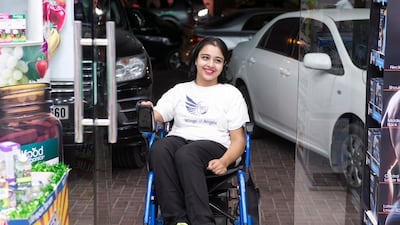When my sister got married, I set off excitedly in search for something to wear. I have never been a fan of shopping; negotiating stores in my wheelchair is not an enjoyable experience but on this particular occasion, my feelings went from dislike to utter hatred. As I trawled a big department store in London, a member of staff approached me. I explained I was looking for a wedding outfit but she cut me off and said: “We don't have anything that will suit you.” I left upset, disappointed and empty-handed, having been made to feel that I did not belong.
I did eventually spend £350 in another store with a fully accessible changing room, where I was allocated a staff member to help me find a variety of clothes to try on, but I know I am not alone in being frustrated by businesses ill-equipped to cater to people like me. Yet we are growing in number and the sooner they realise that, the better. Thanks to an ageing population and medical advancements that have enabled people to survive serious forms of disability and injuries, one billion people worldwide – equivalent to 15 per cent of the global population – experience some form of disability. Among them are about 40 million Arabs, according to UN figures, who are not being recognised as a source of spending power and could contribute hugely to the region's economy.
The problem with so many shops and businesses globally is that they think by having a lift or ramp, they have fulfilled their requirements. This ignores the fact not all disabled people are wheelchair users and simply getting inside a shop is not the sum total of accessibility and inclusion.
Having spoken to several disabled people in the GCC region, one thing they all agreed on is the fact that shopping or going to restaurants is often a challenge. One friend, Tarek Salem, a wheelchair user from Egypt, says 80 per cent of the products he buys are from online stores as most shops in Cairo do not have accessible changing rooms. There is also the issue of having the right products. If you are a wheelchair user, for example, you need your trousers to be a certain length and the material to be comfortable enough to accommodate sitting in a wheelchair all day.
Often products or items of clothing are not within reach of a wheelchair user and stores can be filled with so much stock, there is no room to manoeuvre. Things are even more difficult if you are visually impaired, as Alaa Mahfouz, a doctorate student in Jordan, says. He detests shopping in Amman as he needs someone to accompany him and when he does his grocery shopping from the local market, he is often tricked by traders who sell him fruit and vegetables that are rotten, knowing he won't be able to tell.
A recent study in the UK found the annual spending power of customers with disabilities stands at £249 billion, which opens up the debate of what more retailers, brands and advertisers could do to appeal to disabled people. In the Arab world, 40 million disabled people surely make up one of the largest untapped consumer markets.
So why aren't brands doing more to attract disabled customers? Doing so would mean some tiny but significant steps – featuring disabled models regularly in advertising campaigns, fashion magazines and on the runway, for example, and having disabled members of staff working in stores. Some stores think being inclusive means more expense but they forget that providing better access to more customers spending money will generate greater profits in the long run.
People with disabilities present new, targeted business opportunities, such as designing equipment, technology and services to facilitate adaptive sports and everyday activities. But it's difficult to understand the needs of disabled people without employing or even consulting them. A recent study in the US found companies that improved internal practices for inclusion were four times more likely to see higher shareholder returns. The alternative is to ignore the potential market and its opportunities and not just lose billions of pounds but the chance to play a part in making the world a more inclusive one.
Raya Al Jadir is a freelance journalist and co-founder of the first Arabic lifestyle e-magazine of its kind, Disability Horizons Arabic

